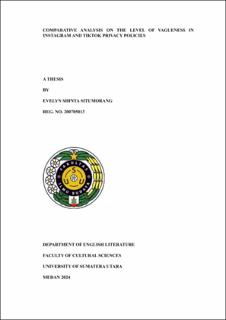Comparative Analysis on The Level of Vagueness in Instagram and Tiktok Privacy Policies

Date
2024Author
Situmorang, Evelyn Shinta
Advisor(s)
Putri, Dian Marisha
Yusuf, Muhammad
Metadata
Show full item recordAbstract
Social media platforms handle vast amounts of user data, yet privacy policies
that govern this data practices are often shrouded in vagueness. This study
investigated vagueness embedded within the privacy policies of two prominent
social media platforms, specifically Instagram and TikTok, aiming to empower users
with greater awareness and understanding regarding privacy. By employing a
quantitative approach with content analysis method, this study seeks to shed light on
the prevalence and the level of vagueness within the two privacy policies. Drawing
upon semantics theory, this research identified vague terms within each policy based
on Bhatia et al.'s taxonomy then measured the vagueness level according to the
scoring system developed by Reidenberg et al. The analysis revealed a significant
presence of vagueness, stemming from Modality terms (e.g., "may", "can"),
Numeric Quantifiers (e.g., "some", "certain"), Conditional terms (e.g., "applicable"),
and Generalization terms (e.g., "general"). Both platforms found heavily relied on
Modality terms, creating uncertainty around data practices permissions and
possibilities. Furthermore, the analysis yielded a Vagueness Score of 1,212 for
Instagram and 1,311 for TikTok, implying a slightly higher level of vagueness in
TikTok privacy policy. Interestingly, despite containing more vague terms,
Instagram privacy policy had a lower Vagueness Score due to the presence of a larger
proportion of clear statements within the longer document. Overall, the research
highlights the critical issue of vague language in social media privacy policies,
hindering user comprehension. The findings emphasize the need for clear and
transparent communication between platforms and users.
Collections
- Undergraduate Theses [874]
